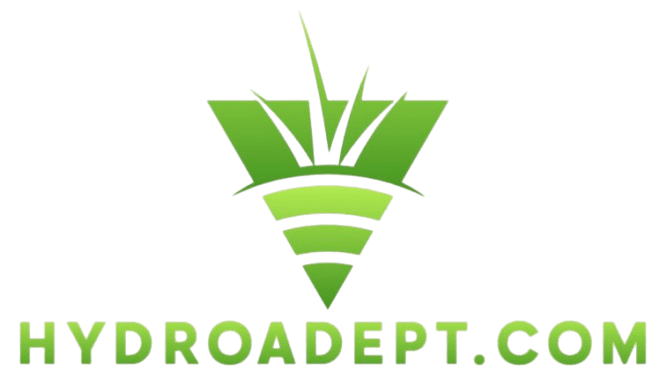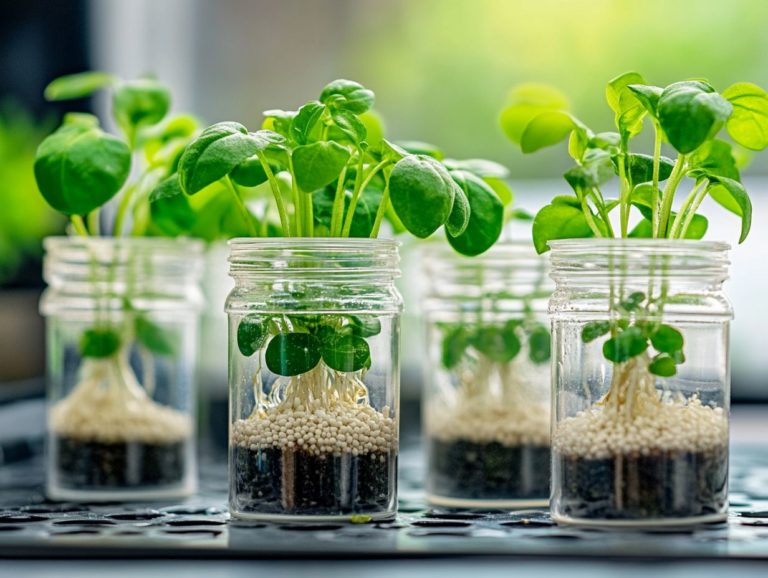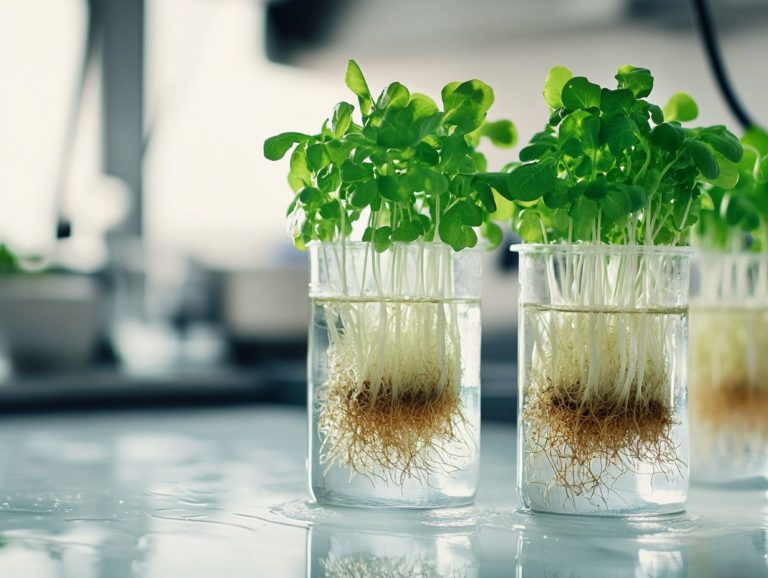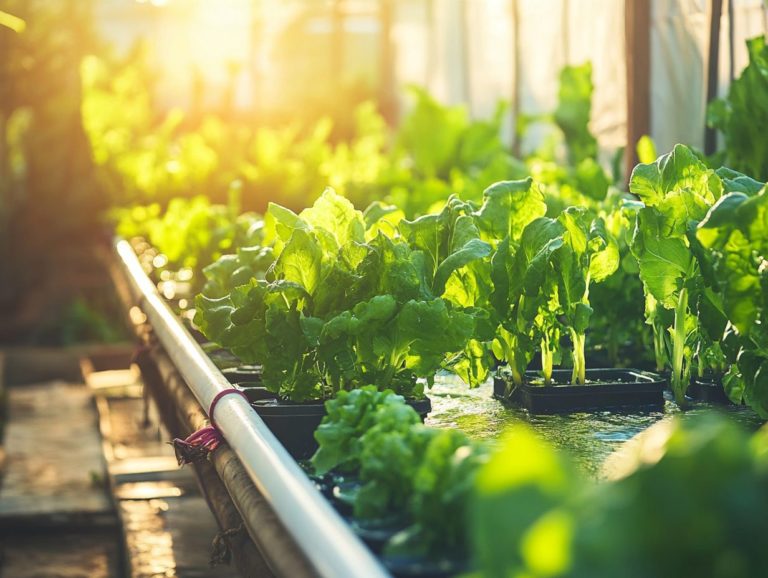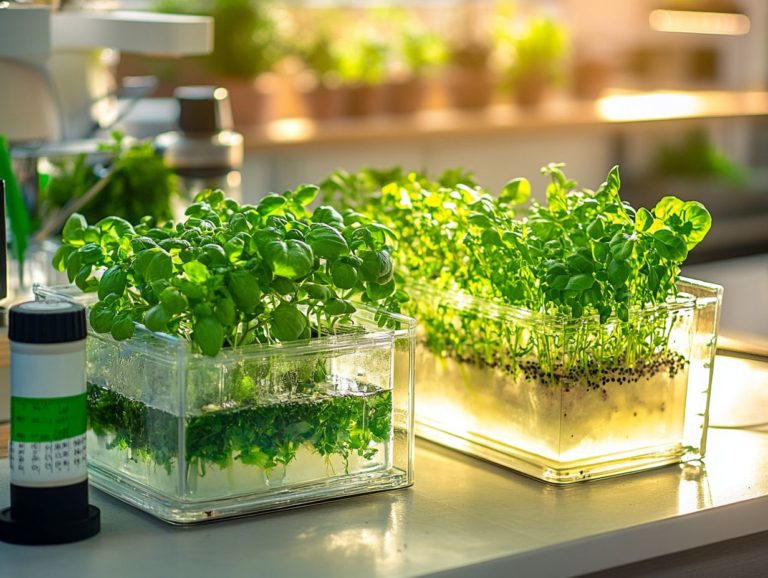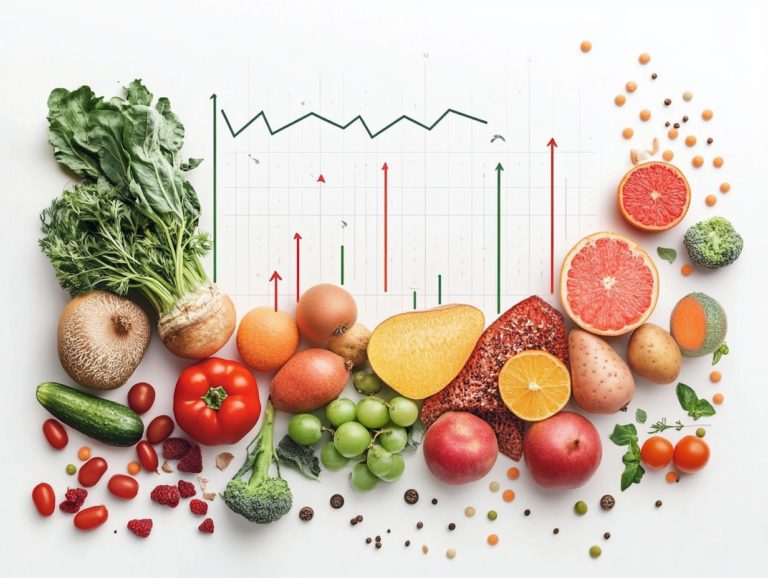5 Must-Know Nutrient Tips for Hydroponics
Hydroponics is an exciting way to grow plants without soil! Ready to unleash the full potential of your plants? Mastering nutrient management is key to your success. This article explores the fundamental aspects of hydroponic nutrients, highlighting their significance and offering practical guidance on maintaining optimal levels.
Whether you re interested in formulating nutrient solutions or recognizing signs of deficiencies, you ll find essential information here that will empower you to develop flourishing hydroponic systems and fully realize the potential of your plants.
Contents
- Key Takeaways:
- 1. What is Hydroponics?
- 2. Importance of Nutrients in Hydroponics
- 3. Essential Nutrients for Hydroponic Plants
- 4. Tips for Nutrient Management in Hydroponics
- 5. Common Nutrient Deficiencies and How to Fix Them
- How to Create a Nutrient Solution for Hydroponics?
- Frequently Asked Questions
- What are the top 5 must-know nutrient tips for hydroponics?
- What types of nutrients are essential for hydroponic plants?
- Can I use regular plant fertilizers in my hydroponic system?
- How often should I change my nutrient solution in a hydroponic system?
- Can I make my own nutrient solution for hydroponics?
Key Takeaways:
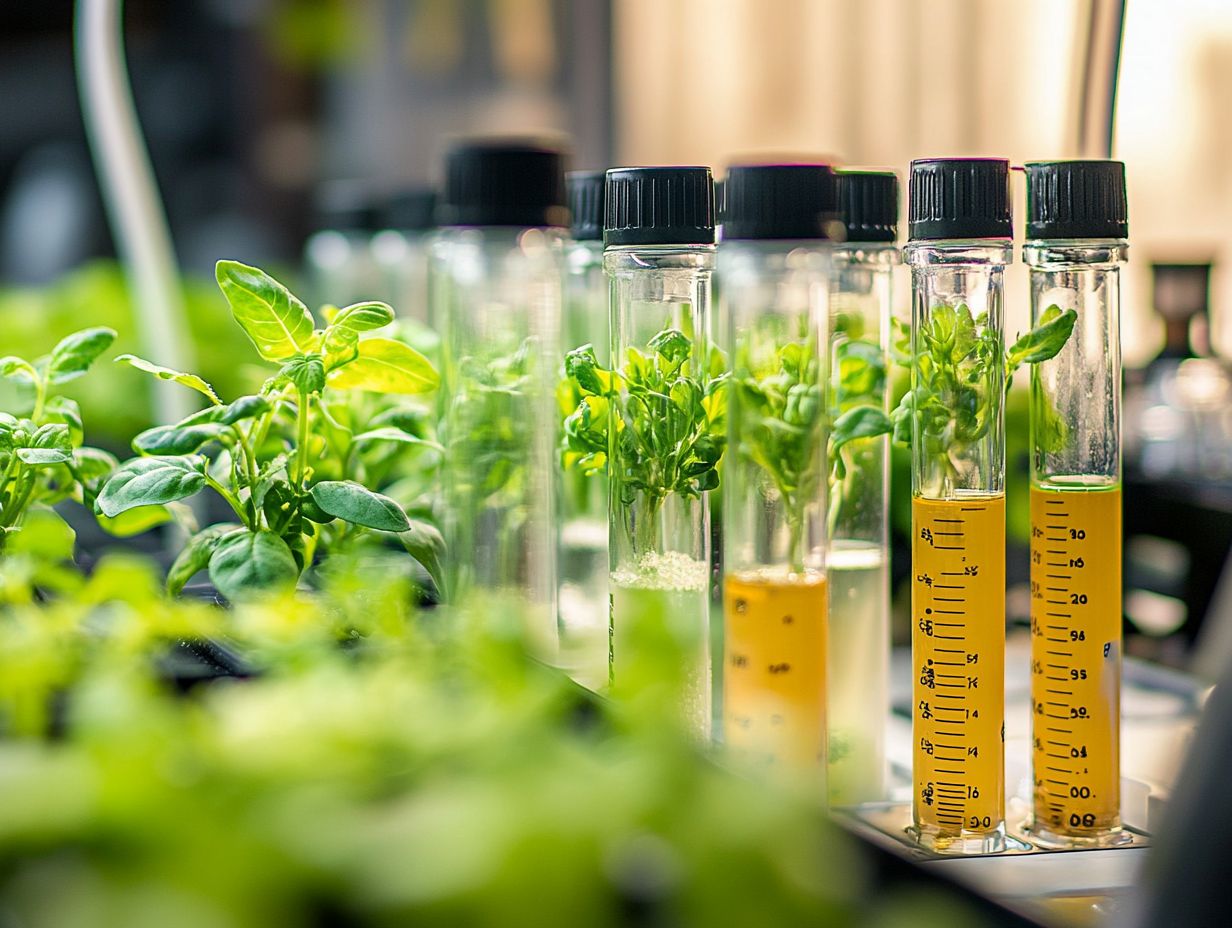
- Understanding the basics of hydroponics is essential for successful plant growth.
- Nutrients play a crucial role in hydroponics and must be carefully managed to ensure optimal plant health.
- Regularly monitoring and addressing nutrient deficiencies is necessary for maintaining healthy hydroponic plants.
1. What is Hydroponics?
Understanding the fundamentals of hydroponics is crucial for anyone eager to elevate their agricultural output. This groundbreaking growing method enables optimal plant growth in both indoor and outdoor settings, utilizing a hydroponic system that discards the need for soil and instead emphasizes nutrient-rich solutions tailored to meet the specific needs of various plants.
This approach not only promotes faster growth cycles but also yields higher outputs compared to traditional farming methods, which often struggle with unpredictable soil conditions. Hydroponics operates on the principle of delivering essential minerals and nutrients directly to the plant roots through water, enhancing absorption while minimizing the risk of pests and diseases.
A range of hydroponic systems is available, including the MEGAPot Hydroponic System, designed for maximum efficiency and space utilization. Each system presents unique advantages, fostering healthier plant development and significantly boosting crop output. This makes hydroponics an enticing choice for both novice gardeners and large-scale agricultural enterprises.
2. Importance of Nutrients in Hydroponics
The significance of nutrients in hydroponics is paramount. A well-balanced nutrient solution, brimming with essential major nutrients and minor nutrients, is crucial for optimizing plant nutrition and maximizing yields in your hydroponic endeavors.
Each nutrient you incorporate plays a unique role in promoting plant health, particularly in enhancing the photosynthesis process, which is how plants turn sunlight into energy. Take magnesium, for example; it s the heart of the chlorophyll molecule, allowing your plants to effectively capture sunlight. Calcium steps in to fortify cell walls, aiding plants in maintaining their structure and resisting disease. Phosphorus is your ally in energy transfer and root development, while potassium expertly regulates water usage and bolsters resilience against stress. Iron is essential for chlorophyll synthesis, ensuring efficient nutrient absorption and oxygen production.
Boron contributes to cell division and reproductive growth, enhancing the overall vitality and productivity of your hydroponically grown plants. These nutrients work together to support robust plant growth, ensuring your hydroponic system thrives.
3. Essential Nutrients for Hydroponic Plants
Essential nutrients are pivotal for the growth and development of hydroponic plants. This includes an array of major nutrients like nitrogen and phosphorus, as well as minor nutrients such as iron and boron each playing a distinct role in ensuring plant health and productivity.
Major nutrients, including potassium, calcium, and magnesium, are essential for key processes like photosynthesis, nutrient transport, and maintaining structural integrity. Conversely, minor nutrients such as manganese, zinc, and copper, though needed in smaller quantities, are essential for enzyme function and overall metabolic activities.
A well-balanced supply of these nutrients not only promotes robust crop growth but also enhances resilience against diseases and significantly boosts yield. Hydroponic systems, which depend on meticulously crafted nutrient solutions, thrive with this balance, leading to healthier plants and bountiful harvests.
By closely monitoring nutrient levels, you can create optimal growth conditions that further support sustainable agricultural practices.
4. Tips for Nutrient Management in Hydroponics
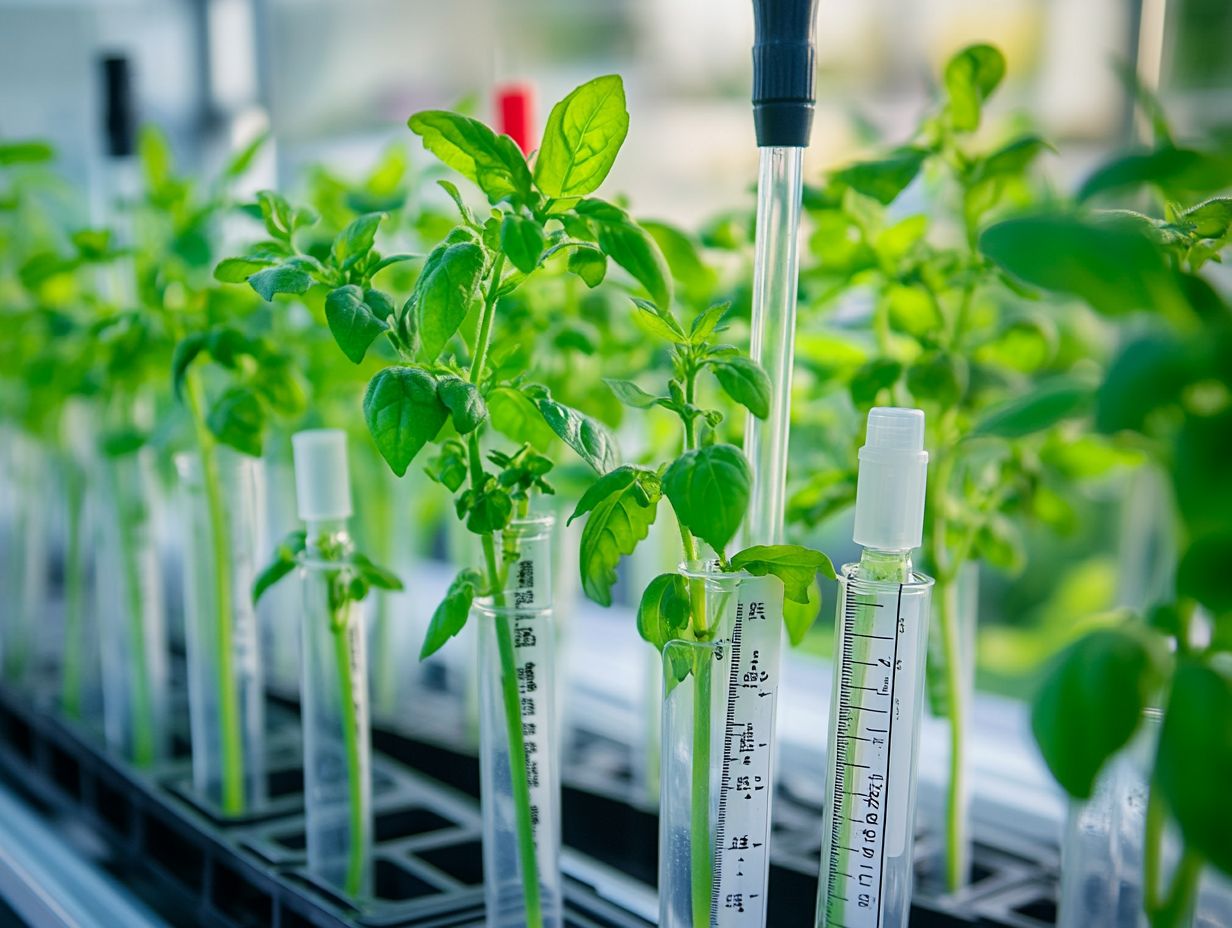
Effective nutrient management in hydroponics is crucial for optimal plant growth and maximizing crop yield. This requires a comprehensive understanding of various hydroponic tips, including monitoring environmental factors, maintaining appropriate temperature control, and selecting the right fertilizers.
Adjusting nutrient solutions is key to success. Young seedlings need different nutrient concentrations compared to their mature counterparts. Regularly monitoring pH and electrical conductivity is essential to ensure that nutrient levels remain balanced, promoting better absorption.
It’s equally vital to assess environmental conditions like humidity and light intensity, as these factors significantly influence nutrient uptake. By creating a stable environment, you can enhance your plants’ health and productivity, leading to impressive yields and strong and resilient crops. For insights on the best products, check out our review of popular hydroponic nutrient brands. Ready to boost your hydroponic garden?
5. Common Nutrient Deficiencies and How to Fix Them
Identifying common nutrient deficiencies in hydroponic plants is crucial for ensuring robust plant growth, as these deficiencies can drastically affect your crop yield. Swift and effective remediation strategies tailored to the specific nutrient in short supply are essential.
When nitrogen is lacking, you might notice your leaves turning yellow and plants stunted in growth. Potassium deficiency could leave you with weak stems and subpar fruit quality. Calcium deficiency typically manifests as blossom end rot in fruits, while magnesium shortages can lead to interveinal chlorosis.
Fixing these issues right away is crucial for thriving plants! You can adjust your nutrient solutions by increasing the necessary elements or incorporating specialized hydroponic fertilizers designed to restore balance. For a deeper dive into this subject, check out Understanding Hydroponic Nutrient Solutions. Regularly testing the nutrient solution and observing plant symptoms will help you correct deficiencies before they escalate into irreversible damage.
How to Create a Nutrient Solution for Hydroponics?
Creating a nutrient solution for hydroponics is an art that involves balancing essential nutrients for optimal plant nutrition. You ll want to focus on both big nutrients and small nutrients, as they are crucial for fostering robust growth and achieving high crop yields in hydroponic systems.
To formulate this solution effectively, start by selecting the right hydroponic fertilizers that include essential elements such as nitrogen, phosphorus, and potassium, along with trace minerals like iron and magnesium. To enhance your approach, consider following these 7 tips for successful hydroponic gardening to determine the appropriate ratios tailored to your plants’ specific needs, since different species and growth stages have varying nutrient requirements.
Once you’ve mixed the fertilizers with water, it s vital to test and adjust the pH level, keeping it within the optimal range generally between 5.5 and 6.5 for maximum nutrient absorption. By continuously monitoring these factors, you can provide personalized support that adapts to your plants lifecycle, whether they re seedlings, vegetative plants, or flowering crops.
What Are the Different Types of Nutrient Solutions?
In hydroponics, you ll encounter various types of nutrient solutions, each crafted to meet specific plant nutrition needs and growth environments. This ensures that your plants receive the perfect balance of essential nutrients throughout their growth cycle.
The most common options include pre-mixed solutions, which offer the convenience of expertly formulated blends suitable for a wide array of crops. Alternatively, you can opt for custom mixtures that allow you to tailor the nutrient profile to your specific plants and hydroponic methods, such as deep water culture or nutrient film technique. To enhance your hydroponic gardening experience, consider these 5 tips for efficient hydroponic gardening.
Pre-mixed solutions are user-friendly and save you time, but they might not cater to unique plant requirements. Custom mixtures provide flexibility and precision, although they require a deeper understanding of nutrient ratios and careful monitoring.
Each choice comes with its own set of advantages and challenges, ultimately influencing the health and yield of your plants.
How Often Should Nutrients Be Added to a Hydroponic System?
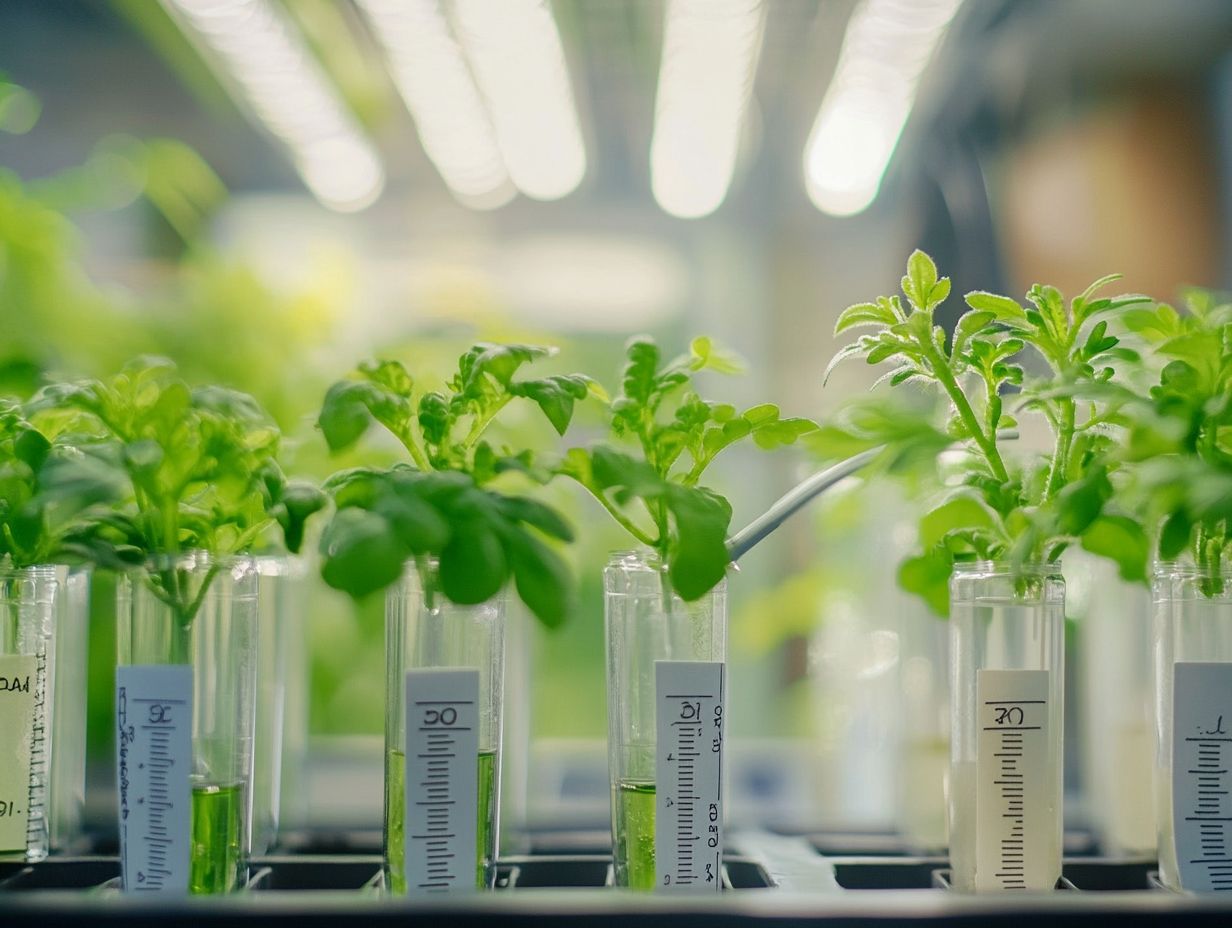
Adding nutrients at the right time is crucial for plant growth. Frequent adjustments enhance nutrient uptake and improve crop yield based on your plants’ life cycle stage.
Several factors impact how often you should add nutrients. These include the type of plant, its growth stage, and the environmental conditions.
For instance, leafy greens may need more frequent nutrient additions during rapid growth. Flowering plants might benefit from a different schedule that suits their developmental needs.
Variables like humidity, temperature, and light exposure can affect how quickly plants absorb nutrients. Monitor these conditions closely.
For different hydroponic setups, customizing your nutrient schedule can optimize plant health and increase yields.
What Are the Best Sources of Nutrients for Hydroponic Plants?
Choosing the right nutrient sources is vital for strong growth and high crop yield. Hydroponic fertilizers are designed to meet specific nutrient needs of various plant species.
Consider liquid fertilizers for quick nutrient uptake. Slow-release formulations provide nutrients gradually, ensuring steady growth.
Organic fertilizers, derived from natural sources, can improve soil health and boost microbial activity. Synthetic fertilizers offer precise nutrient formulations for rapid growth.
Your choice between organic and synthetic can affect the flavor, nutrient density, and quality of your produce. Understand the benefits of each to select the right blend for your setup.
How Can pH Levels Affect Nutrient Uptake in Hydroponics?
Maintaining optimal pH levels is essential for nutrient uptake in hydroponics. An imbalanced pH can hinder your plants’ ability to absorb crucial nutrients.
For hydroponic systems, aim for a pH between 5.5 and 6.5. You can measure and adjust these levels using a reliable pH meter or testing kit.
If levels drift outside this range, adjust them with pH up or pH down solutions. This careful management keeps nutrients soluble and caters to your plants’ specific needs.
What Are the Signs of Nutrient Burn in Hydroponic Plants?
Nutrient burn is a common issue in hydroponics, marked by distinct symptoms of excess nutrients. Address it quickly to avoid damaging plant tissues and reducing yield.
You may see yellowing at the edges of leaves, browning spots, and stunted growth. Over-fertilization, imbalanced solutions, and poor water management often cause nutrient burn.
To prevent nutrient burn, regularly monitor the concentration of your nutrient solution. Diluting the mix or flushing the system with plain water can help your plants recover.
Frequently Asked Questions
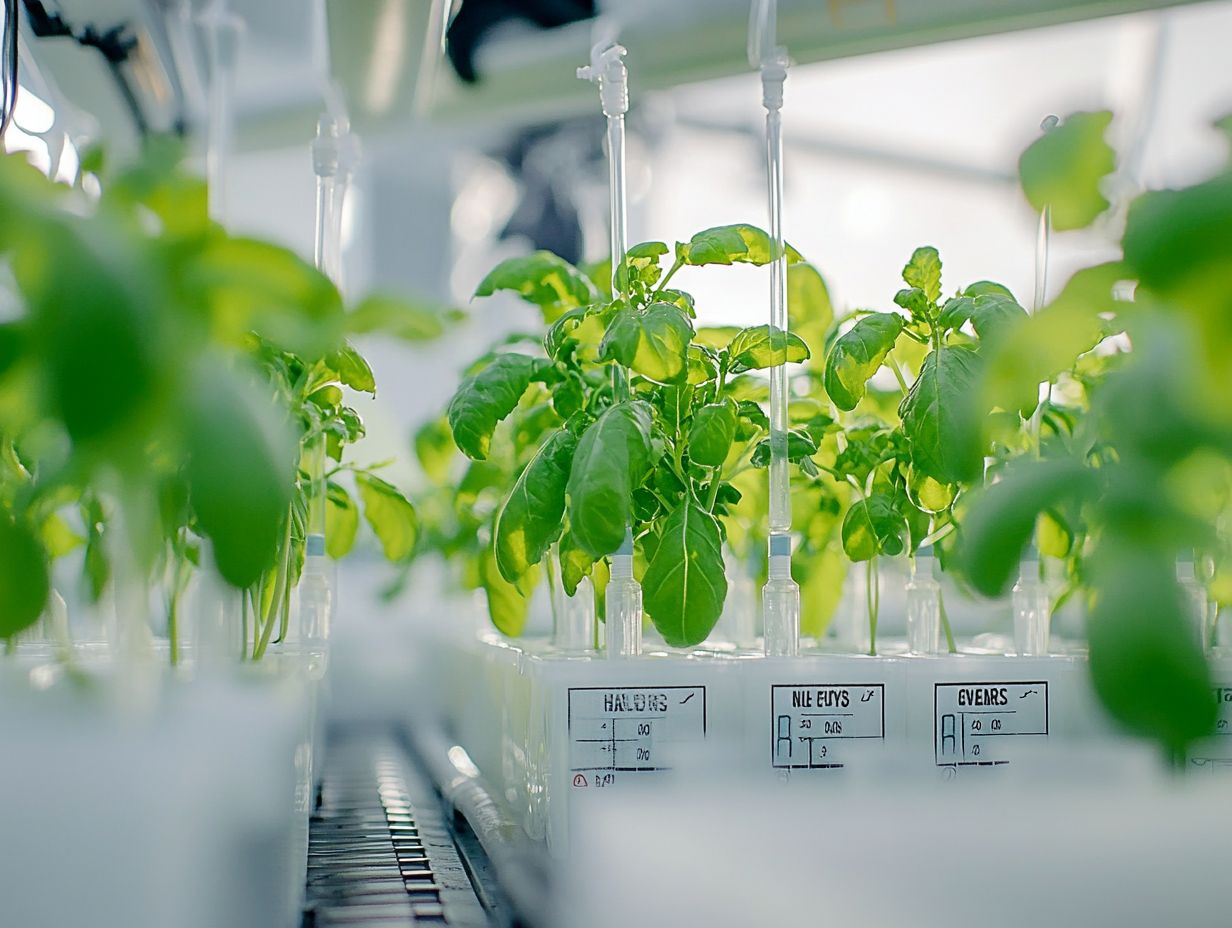
What are the top 5 must-know nutrient tips for hydroponics?
1. Choose the right nutrients for your plants. Different plants require specific types and ratios of nutrients.
Research your plants to select the suitable nutrients.
2. Monitor pH levels. The right pH is crucial for nutrient absorption.
Invest in a reliable pH meter to keep your plants healthy.
3. Watch for nutrient deficiencies. Signs include yellowing leaves or stunted growth.
Adjust your nutrient levels to avoid further issues.
4. Don t overdo it. Too much can harm your plants.
Follow the recommended dosage for your nutrient solution. Resist the urge to overfeed!
5. Flush your system regularly. Salts and minerals can build up over time.
Flushing with clean water every 1-2 weeks keeps your plants thriving.
What types of nutrients are essential for hydroponic plants?
The three main nutrients that hydroponic plants need are nitrogen, phosphorus, and potassium (NPK). These nutrients are essential for healthy plant growth and development.
Can I use regular plant fertilizers in my hydroponic system?
No, regular plant fertilizers are not suitable for use in hydroponic systems. Hydroponic plants absorb nutrients directly from the water, so the nutrients need to be in a specific form and ratio.
Regular fertilizers may not dissolve properly or may contain harmful additives for hydroponic plants.
How often should I change my nutrient solution in a hydroponic system?
It is recommended to change your nutrient solution every 1-2 weeks, depending on the size of your system and the type of plants you are growing.
This helps prevent nutrient imbalances and ensures your plants have access to fresh, balanced nutrients.
Can I make my own nutrient solution for hydroponics?
Yes, it is possible to make your own nutrient solution for hydroponic plants. However, it requires careful research and understanding of the specific nutrient needs for your plants.
It is often easier and more reliable to purchase pre-made nutrient solutions from reputable hydroponic suppliers.
